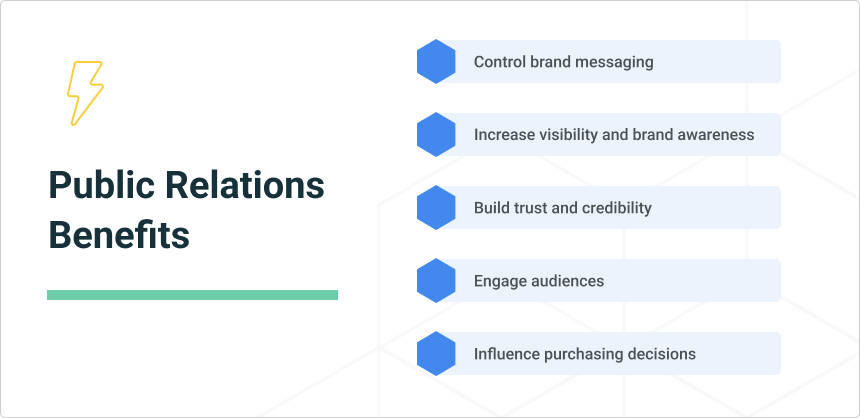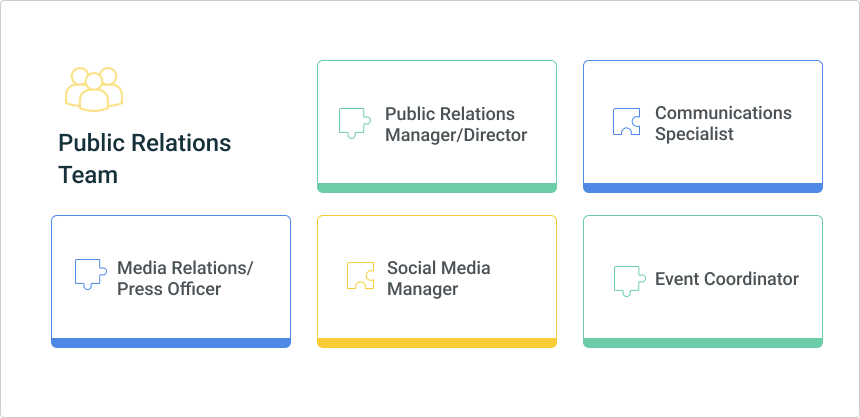Updated February 23, 2026
Public relations, or PR, is an art that includes crafting compelling narratives, shaping perceptions, and building bridges between brands and their audiences. But to do so effectively requires a solid understanding of your brand, target audience, local and nationwide media, and corporate communication.
A successful public relations strategy can be challenging to develop, but it’s well worth the effort. PR services can help organizations and individuals enhance their public perception, improve their credibility, and foster brand trust.
This guide dives into everything you need to know about PR services and how to hire the right PR service provider to grow your business.
Browse Related PR Focus Areas
What is Public Relations?
Public Relations: The strategic use of communication and various media channels to promote positive public perception. This includes managing both internal and external communication to control messaging and narrative around a brand, individual, or organization.
The primary goal of PR is to establish, maintain, or improve public perception through effective communication and relationship management. Often, the goal of a PR campaign is for a brand to connect with various stakeholders, such as the media, customers, employees, investors, and the public.
To shape general perceptions and influence opinions, PR professionals utilize various strategies and tactics to craft compelling messages, stories, and campaigns.
These tactics can include building relationships with journalists and media outlets to gain positive media coverage, monitoring public perception and addressing negative events, crafting press releases and other content, and more.
To be effective, PR campaigns need to be strategic. PR professionals spend a significant amount of time collecting data about the business they’re supporting, their market, and the audience they’re appealing to. From there, they will formulate a bespoke PR plan to help the business reach their goals.
As the media campaign continues, they will track performance metrics to gauge public opinion and mark progress.
Some of the tasks they will perform include:
- Tracking media mentions
- Evaluating social media engagement
- Reviewing buyer personas & customer insights
- Developing content for your website, social media, and external platforms
- Planning paid media campaigns
- Managing events
- Writing press releases
- Building community engagement
As mentioned above, the services a PR team will actually provide depend largely on the goals of your project. To ensure that specific audiences receive the right messaging at the right time, PR campaigns should be carefully planned using a content calendar.
When diligently planned and executed, PR services can help companies increase visibility and build trust in their organization.
Of course, PR professionals must also be flexible to respond to trending topics or comments pertaining to the organization they’re representing. This is key for brands hoping to build relationships in their local community and appear authentic to the public.
Finding a PR partner with knowledge and media contacts in your region is essential.
PR Services by Country
PR Services by City
5 Benefits of PR Services
The benefits of PR services extend far beyond the surface-level perception of a brand. They delve into the realm of trust-building, credibility, and long-term success. From boosting brand reputation and generating positive media coverage to fostering meaningful connections with target audiences, the advantages of investing in PR are vast.

Here are some of the biggest reasons companies invest in PR services:
- Control brand messaging. Brand messaging shapes how customers perceive and connect with a brand. By carefully controlling the narrative around your organization, you can more effectively connect with customers and influence their opinions.
- Increase visibility and brand awareness. PR efforts like coordinating media pitches, speaking engagements, interviews, and feature stories can get your brand in front of a wider audience.
- Build trust and credibility. Consumers inherently trust brands that are transparent. By sharing relevant information, addressing issues honestly, and being authentic in their messaging, brands can build trust by demonstrating reliability and integrity.
- Engage audiences. Effective PR engages audiences through two-way communication. This includes actively listening to audience feedback, responding to inquiries, and addressing concerns promptly. By facilitating dialogue and showing genuine interest in audience opinions, PR builds stronger connections and fosters engagement. This can include responding to social media comments, sharing user-generated content, and building community initiatives.
- Influence purchasing decisions. At the end of the day, PR is about supporting larger business objectives. When consumers feel connected to a brand, they’re more likely to make a purchase. Therefore, investing in building relationships with audiences like investors, stakeholders, customers, and the media, can build trust and make it more likely for consumers to buy your product and/or services.
What Services do PR Professionals Provide?
The services that a PR firm provides depends largely on what you aim to achieve over the course of the campaign. Here are some of the most common services that a PR firm will offer, the tasks involved, and the goals of each:
- Corporate Communications
- Event Management
- Investor Relations
- Public Affairs
- Reputation Management
Corporate Communications
Corporate communications focuses on disseminating information within an organization, but can also include external communication. To ensure effective communication internally and promote a positive company culture, they will provide important updates for employees and communicate company policies.
However, they will also handle communication with external stakeholders, such as customers, investors, media, and the public in order to manage expectations while conveying valuable information. This means that they can help report on financial performance, crafting compelling annual reports, facilitate investor meetings, announce product releases, and more.
By ensuring positive communication with all invested parties, you can enhance your company reputation and brand image.
Crisis Communications
Even the best organizations can receive bad press on occasion. When an event threatens your business’s reputation, you need experts to manage communication and reduce the negative impact on your organization.
Crisis communication companies help clients develop an effective communication strategy tailored to the specific emergency situation. They assess the risks and determine the most appropriate channels and messaging to address the situation.
Depending on the situation, they will manage media relations, handle press releases, and coordinate interviews in response. Providing information and addressing comments head-on can mitigate backlash.
Even more importantly, they can help prevent crises by providing training programs for their clients. This can help organizations respond appropriately and handle emergencies effectively.
Event Management
Whether it’s a fundraising opportunity, company celebration, or product launch, events are a great way for companies to promote their business and connect with various audiences. Planning and strategizing events like this can be a lot of work, but PR service providers can ensure that they go off without a hitch.
PR service providers assist event planners with strategic planning for events, ensuring that the event's objectives align with the organization's overall communication and branding goals.
They can also help promote the event by leveraging the media and social platforms to generate publicity and increase event visibility. Even after the event, they analyze media coverage, attendee feedback, and key performance indicators to provide insights and recommendations for future events.
Investor Relations
Communicating with investors is essential for any business with financial stakeholders. By providing relevant information on organizational operations, companies align the expectations of investors with company goals, boost investor confidence, and mitigate risks.
PR service providers can facilitate communication between executive leadership and investor stakeholders in several ways, including providing financial reports, shareholder information, presentations, SEC filing, and upcoming events.
Any of these strategies ensure transparency and strong communication. Together, they can help build trust in your organization.
Public Affairs
Many organizations can be impacted by new or existing policies, both negatively and positively. Either way, businesses need to stay ahead of public policies. To do so, companies must build relationships with the public — namely, organizational bodies such as governments, politicians, local communities, trade associations, business groups, and unions.
Public affairs and public relations are often used interchangeably, but are slightly different. They both involve leveraging comms and relationships with the public, but public affairs is more political and less commercial in nature.
Public affairs specialists aim to influence public policy and build relationships with government entities at the local, regional, and national levels. They are instrumental in helping organizations navigate topical issues and shape public opinion.
Reputation Management
Managing an organization’s reputation is a big part of public relations. By monitoring brand perception and seeking opportunities to build a positive image in the public eye, you can improve customer loyalty and grow brand recognition.
There are many PR services that can enhance your reputation. For instance, PR teams can help you create campaigns highlighting your brand’s best attributes — whether that’s your ethical manufacturing process, expert team members, or even superior product.
They may also focus on building thought leadership by positioning key executives at the forefront of the industry through media coverage and captivating content.
Efforts like this can build credibility and showcase how an organization stands apart from others in the market. As a result, reputation management can help support broader business objectives like customer acquisition and retention.
How to Assess the Performance of PR Services
When investing in PR services, tracking the performance of your campaigns is essential to identify what strategies are working, determining your ROI, and understanding the impact of your PR campaigns.
Depending on the services that your PR firms are providing, you can outline key performance indicators (KPIs) to help you determine the success of your partnership. Common KPIs for PR services include:
- Media Coverage: The number and quality of media placements secured for clients can indicate the success of a PR campaign. This could include features in newspapers, magazines, online publications, TV interviews, or radio appearances.
- Impressions and Reach: Tracking the number of impressions (how many people potentially saw the coverage) and the overall reach (the size of the audience reached) can gauge the extent of the PR campaign's impact.
- Brand Mentions: Monitoring how often a client's brand is mentioned in media coverage or social media conversations can help assess brand visibility and awareness.
- Share of Voice: Comparing the volume and prominence of media coverage for a client against competitors can provide insight into market share and brand positioning.
- Sentiment Analysis: Analyzing the sentiment of media coverage and social media mentions (positive, negative, or neutral) can provide insight into public perception and reputation management.
What is a PR Team?
Comprehensive PR strategies include a wide range of tasks, all with the goal of boosting your business’s public image. To be effective, however, these strategies rely on a team of experts. Each individual plays a different role and brings specific expertise to the table. Whether they’re strategizing or are responsible for delivering influential content, each person is essential to the success of the PR campaign.

Here are some of the most common roles that comprise a PR team and how the can impact your public relations campaign:
Who Makes Up a PR Team?
- Public Relations Manager/Director: The head of the PR team, responsible for developing and implementing PR strategies, managing media relations, and overseeing the team's activities.
- Communications Specialist: Handles the day-to-day communication tasks, such as writing press releases, managing social media accounts, and creating content for various channels.
- Media Relations/Press Officer: Builds and maintains relationships with journalists and media outlets, coordinates interviews and press conferences, and manages media inquiries.
- Content Writer/Copywriter: Creates compelling content for press releases, articles, blog posts, social media updates, and other communication materials.
- Social Media Manager: Manages the organization's social media presence, engages with followers, creates and schedules posts, and monitors social media trends and conversations.
- Event Coordinator: Plans and executes PR events, such as product launches, press conferences, and trade shows, ensuring smooth logistics and maximum media coverage.
- Crisis Communication Specialist: Handles PR crises by developing crisis management plans, drafting crisis statements, and coordinating responses to protect the organization's reputation.
- Graphic Designer/Visual Specialist: Creates visually appealing and brand-aligned graphics, infographics, and other visual assets for PR campaigns and materials.
What To Look For When Hiring PR Services
Whether you’re looking to build an internal PR team or plan to outsource to a PR service provider, finding the right partner is essential to the success of your public relations campaigns.
This is easier said than done. There are plenty of PR professionals that you can hire in your area or around the world — but which one is right for your business?
For most businesses, the most important factors when searching for a PR partner are your goals and budget. Understanding what you’re hoping to achieve by hiring a PR partner can guide your PR strategy and help you narrow down your search. Your PR budget is just as important,helping to eliminate certain providers that fall outside your price range.
If budget, location and industry expertise are at the top of your list of requirements, you’re not alone.
Criteria For Hiring a PR Firm
- Budget
- Location
- Industry experience
- Ability to deliver a custom PR strategy for your needs
- Can produce high-quality content like press releases and white papers
- Sets KPIs and reports on project success
- History of client satisfaction
One of the best ways to gather information on potential partners is by reading through client reviews on B2B ratings platforms (like Clutch). Reading first-hand reviews from real clients can help you discover information about what services each company offers, how much they charge, and how satisfied previous clients have been with their work.
What Matters to You Most?
While the beginning of this process is purely educational and exploratory, start thinking about what matters to you most. It could be that your PR partner is local, that they have extensive experience in your industry, or that they specialize in specific PR services.
By pinpointing the criteria for hiring a PR partner that is most important to your business, you can release a request for proposal (RFP) or begin shortlisting and reaching out to preferred vendors.
At this stage, you will have to assess potential PR partners more critically. Can they deliver the results you want? And do they meet the other requirements you’ve outlined?
When interviewing potential PR partners, you’ll need to evaluate the quality of their work and the value they offer. Questions about projects they’ve worked on in the past and the results they’ve delivered can provide insight into their experience. You can verify the quality of their work by speaking with past clients and reviewing their portfolio as well.
In addition to the quality of their work, it’s also important to consider the ease of collaboration, how well they communicate, and their pricing structure. As you’re interviewing potential PR partners, be sure to ask about logistical information as well to get a feel for what it would be like to work with them.
Here are a few questions you should ask when interviewing PR service providers:
10 Questions to Ask When Hiring PR Services
- What experience do you have in our industry?
- Can you provide examples of successful PR campaigns or projects you've worked on?
- How do you approach developing a PR strategy? How would you tailor your approach to meet our needs?
- How do you measure the success of PR campaigns? What metrics do you track and how do you report them?
- How do you adapt to changing media landscapes and trends?
- How do you approach media relations?
- How do you handle crisis communication situations?
- How do you communicate and collaborate with clients?
- Can you provide testimonials and connect us with client references?
- What is your pricing structure and what services are included?
Armed with all of the information you need to make an informed decision, you can select the top PR service provider for your business. Once you do, be sure to scope the project thoroughly in your contract. Clearly state your objectives, create a timeline, and identify all team responsibilities to ensure that everyone is aligned before the project begins.
Need a budget for PR services?
Download Your PR BudgetHow PR Services Can Support Your Organization's Primary Goals
Public relations services can help organizations like yours control the narrative and messaging surrounding your brand. Through press releases, media relations, events, and crisis management, PR professionals are dedicated to enhancing trust, managing your reputation, and promoting your organization to the public.
When hiring for PR services, be sure to vet potential partners thoroughly and discuss your goals. While the specific needs of your organization are unique, PR experts can create a bespoke strategy to strengthen public perception.
No matter what your requirements are for hiring a PR service provider, Clutch can help you refine your search for the right partner for your business.















